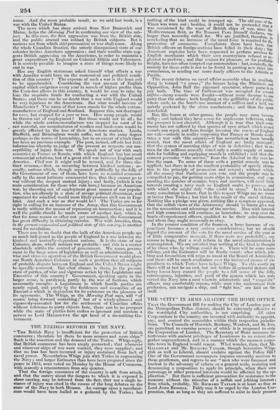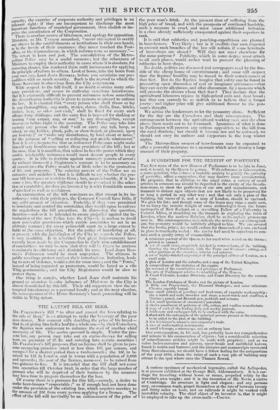TIIE "CITY" IN ARMS AGAINST THE HOME OFFICE.
TIIAT the Government Bill for making the City of London part of the Metropolitan Police district, should be extremely offensive to the worshipful City authorities, is not surprising. All other Corporations in the country are invested with authority to appoint, pay, and control the constables within their respective jurisdic- tions. The Councils of Harwich, Banbury, Wcnlock, and St. Ives, are permitted to exercise powers of which it is proposed to strip the Corporation of London. The Secretary of State menaces in- terference with ancient privileges of Londoners to an extent alto- gether unprecedented, and in a manner which the meanest corpo- rate town in England would resent. What wonder, then, that l!fIr. GALLOWAY and Mr. Mensal) TAYLOR, though heretofore Whig- gish as well as Liberal, should exclaim against the Police Bill? One of the Government newspapers imputes unworthy motives to these gentlemen, and regrets to see "men who were foremost and loudest in the advocacy of reform on a general scale, resisting and denouncing a proposition to apply its principle, when their own patronage or other personal interests would be affected by the ap- plication." But there is sufficient provocation for resistance to the measure without the stimulus of a selfish and jobbing interest ; from which, probably, Mr. RICHARD TAYLOR is at least as free as Lord JonN RussEr.L. Fairly may it be urged by the London Cor- poration, that as long as they are suffered to exist in their present
capacity, the exercise of corporate authority and privileges is an inherent right : if they are incompetent to discharge the most important functions of municipal government, then abolish or im- prove the constitution of the Corporation.
There is another source of bitterness, and apology for opposition. 3linisters, as Mr. TAYLOR remarked, "never attempted to rectify any abuses in the establishments or institutions in their own hands, or in the hands of their creatures : they never touched the Post- office, or the Customhouse, in which reforms were so necessary."— The retort is keen and just. The consolidation of the Metro- politan Police may be at useful measure ; but the reluctance of Ministers to employ their authority in eases where it is absolute, for removing abuses, has rendered them unfit instruments for applying the principle ofretbrin to others. Look at home, take the beam from your own eye, Lord .Ionsi RUSSELL, before you scrutinize our pec- cadilloes with so much severity. Such is the reproof to which the Home Secretary is obnoxious from the City corporators.
With respect to the bill itself, it no doubt contains many arbi- trary provisi(%ns, and seems to authorize vexatious interference. But it is extremely difficult to prevent nuisances unless something like discretionary authority is given to persons employed to enforce the law. It is enacted that " every person who shall throw or lay in any thoroughthre, any coals, stones, slates, shells, lime, bricks, timber, iron, or other materials," shall be fined for every such offence tbrty shillings; and the same fine is imposed for shaking or beating "any carpet, rug, or mat," in any thoroughfare, except betbre eight in the morning. The Police may take into
custody any person who shall "roll or carry any tub, hoop, or wheel, or any ladder, plank, pole, or show-board, or placard, upon any footway ;" or "make any disturbance, by loud shout or noise," for the purpose of " selling or collecting any article whatsoever." Now it is easy to perceive that an indiscreet Policeman might make himself very troublesome under these provisions of the bill ; but at the same time it is manifest, that unless he has the power which they confer, intolerable nuisances would meet decent people in every quarter. It is idle to declaim against summary powers of arrest ; for without them—if a Magistrate's warrant is to be necessary on all occasions—the Police would be of little value in the protection of life auul property. The existing powers of the Police are so extensive and undefined, that it is difficult to say whether the pre- sent bill increases or restricts them ; but, unquestionably, if it be- come a law, the greatest vigilance should be eYtTcised in the selec- tion or constables, for they are invested by it with formidable means of mischief as well as u:,:efulness.
An examination of the bill convinces us, that except in its in- terfereuce with their privileges, the Common Council have little, if
any, solid ground of objection. Probably, if they were permitted to nominate and control the constables, they would agree to enforce the regulations the bill prescribes. In discussing the question, therefore—unless it is intended to create prejudice against the in- troduction of the new Police auto the City—it is useless to dwell upon particular provisions which enable constables to act in an arbitrary manner ; for every police-bill must to at large extent be liable to the same objection. But the policy of interfering at all, at present, with the jurisdiction of the City as regards the Police, is very doubtful. It is whaitted that greet improvements have recently been made by the Corporation in their own establishment ofeonstables : we may be sure that they will hi future be anxious to maintain its efficiency and diminish its cost. Lord. JOHN Rus- ssm.'s Policemen would be most unpopular. The citizens in public meetings protest against their introduction. Irritation, lead- ing to acts of violence, would exist for some time ; and the "Force," instead of being regarded as protectors, would be hated as a vile Whig gendarmerie ; and the City Magistrates would be slow to protect them.
One thing is certain, whether Lord Joni shall maintain his ground or abandon it—the influence of Ministers in the City is alniost demolished by this bill. Their old supporters view the at- tempted interference as a personal insult ; and at the next election, the consequences of the Ilinne Secretary's harsh proceeding will be visible in Whig defeat.



























 Previous page
Previous page